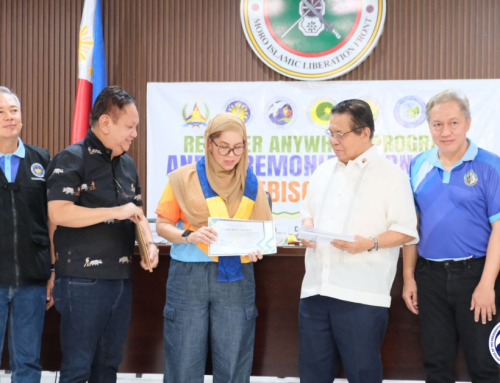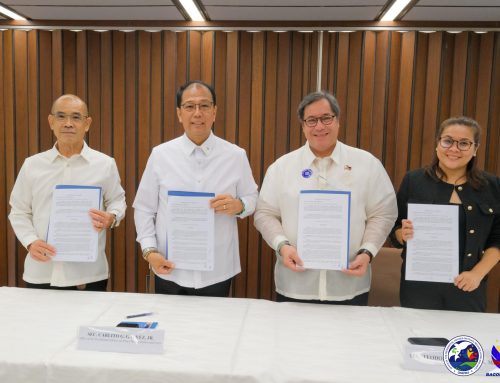The Office of the Presidential Adviser on the Peace Process, mounted the second instalment of its series of media briefings called “Huntahan sa Kapayapaan” today in Pasig City to give updates on the progress of the proposed Bangsamoro Basic Law (BBL) drafted by the 21-member Bangsamoro Transition Committee appointed by President Rodrigo Roa Duterte.
Present in the event was Deputy Presidential Peace Adviser Undersecretary Nabil Tan who discussed the historical background and context of the Bangsamoro’s aspiration for genuine autonomy and self-determination, and Commissioner Maisara Damdamun-Latiph of the Bangsamoro Transition Commission who discussed the salient features of the proposed BBL.
Product of decades of peace negotiations
In his keynote message, Usec. Tan regarded the proposed BBL as the “product of decades of often tedious peace negotiations.”
“The passage and the ratification of the Bangsamoro Basic Law are the realization of the signed peace agreements between the government and the Moro fronts to address the historical injustices committed against the Bangsamoro,” Usec. Tan said as he made emphasis on the root cause of the armed conflict in Mindanao.
On March 2014, the Comprehensive Agreement on the Bangsamoro which serves as the backbone and guiding document of the proposed BBL was signed by the government and the Moro Islamic Liberation Front (MILF).
Further, the implementation of the CAB includes the ratification of an enabling law that will pave way for the establishment of the Bangsamoro, eventually replacing the current Autonomous Region of Muslim Mindanao.
Addressing the root causes of armed conflict
Usec. Tan traced the root cause of the century-long conflict in Mindanao which “dates back from the Spanish Colonization.”
“For centuries, the Spanish colonial government tried to conquer Muslim Mindanao but history tells us it never succeeded. When the Americans came, the Muslims continued to fight for its independence but not as fierce during the Moro-Spanish wars,” said Usec. Tan.
The continued assertion of the Bangsamoro resulted to the creation of the Moro National Liberation Front (MNLF) that dates back to the 70’s therefore complementing the political struggle with an armed force.
Autonomy in the regions of Mindanao was agreed upon through the signing of the 1976 Tripoli Agreement signed by the Government of the Philippines and the Moro National Liberation Front. The same was eventually enshrined in the 1987 Philippine Constitution and passed by Congress through the enactment of Republic Act No. 6734 as amended by R.A. 9054.
In 2012 the government and the MILF signed the Framework Agreement on the Bangsamoro (FAB), and the Comprehensive Agreement of the Bangsamoro (CAB) in 2014.
“The signing of the CAB was truly momentous, as it signalled the start of a new phase in the relationship between the Philippine Government and the MILF. It also marked the beginning of the challenging task of implementing the peace accord through the crafting of an enabling law, in the form of the Bangsamor Basic Law (BBL), that will make possible the establishment of the new Bangsamoro political entity and provide for its basic structure, in recognition of the cause and aspirations of the Bangsamoro people,” Usec. Tan said.
The new proposed BBL, which was drafted by the 21-member BTC to address these historical injustices and move peace and stability forward, is going through deliberations at both Houses of Congress.
Call for support
Stressing the vital role that the media plays, Usec. Tan encouraged the media to help “by proactively reporting the Bangsamoro peace process.”
“The President has thrown his full support behind the BBL. He believes that it is only through the law’s passage that the historical injustices against the Bangsamoro can be finally addressed,” said Usec. Tan citing President Duterte’s all out support for the realization of the sustainable peace and development in the Bangsamoro.
“I am urging everybody to understand, it’s about time the historical injustices committed against the Bangsamoro be corrected, ” Pres. Duterte said during the launch of the Overseas Filipino Bank in Manila.
Currently, there are 5 versions of the BBL pending in the House of Representatives and Senate.
The government is pushing for the version drafted by the BTC, which is now in the House of Representatives as House Bill No. 6475 filed by House Speaker Pantaleon Alvarez and other representatives.
Recently, Sen. Miguel Zubiri adopted the BTC version of the BBL as the working draft in the resumption of the senate hearings, filed now as S.B. 1646 and withdrew his version which he had earlier filed.
To watch the live stream during the briefing, click this link: https://www.facebook.com/peacegovph/videos/1584531358250861/
BTC Commissioner Maisara Damdamun-Latiph discussed the salient points and the myths and facts surrounding the proposed Bangsamoro Basic Law.











